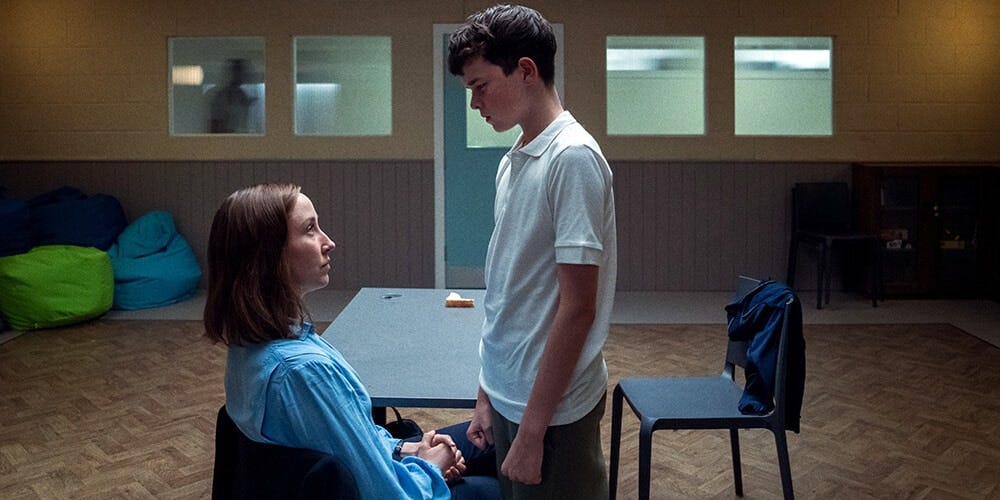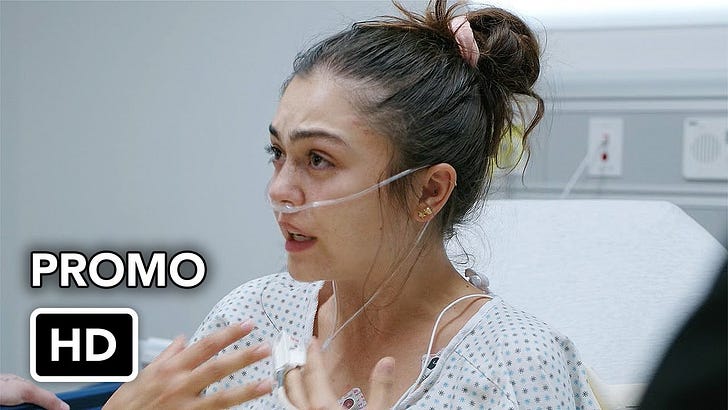Scene Study: 'Adolescence'
What a restless camera and a pair of outbursts tell us about violence and despair in the acclaimed Netflix drama.
“Are we allowed to talk like this?”
Two people sit at a rectangular table, talking. Briony (Erin Doherty) is a court-appointed psychologist, there to interview Jamie (Owen Cooper), a 13-year-old boy accused of a horrific crime in the Netflix series Adolescence.
Adolescence, for those of you who haven’t seen it yet, is a four-episode limited series with a signature stylistic twist: each episode is filmed as a single unbroken take. It is a feat of technical skill and actorly endurance, closer to live theater than the traditional method of making television. (Theses could be written about the confluence of Adolescence and The Studio, the satirical Apple series whose second episode features a similar bravura demonstration of an auteur attempting to film a single-take conclusion to her film, and being repeatedly hampered by the irritating presence of studio boss Seth Rogen.)
The restless camera in Adolescence never settles on a single distance to take from its characters. Sometimes it is practically under their chins; at other times, it recedes to the far end of the table, as if leaning back to give the characters some space. The camera is silently asking us how close we are to these subjects, or how close we might feel to them. It is also wondering how much we might comprehend.
We know, after the conclusion of the first episode, that Jamie’s culpability for the murder of his classmate Katie is not in doubt. What is at stake here, instead, is our understanding, a word Jamie keeps circling back to, poking fun at Briony’s insistence that all she wants is to grasp Jamie’s “understanding” of the circumstances that led to Katie’s death.
Briony’s face remains impassive as she questions Jamie, her hair perfectly curled behind her ear, a single silver-and-pearl teardrop earring visible as a symbol of her professional polish. But the camera pulls close to Briony, and we can see, on second look, that her face is less impassive than rigorously held in place, repelling the waves of emotion surging under her skin.
Jamie, to this point, has been mostly polite, soft-spoken. But something begins to shift almost halfway through this episode, some hint of the tectonic plates rubbing together under his surface. Jamie asks for her help returning home until his trial, and when she demurs, he gets out of his chair and stands over Briony. Jamie slams his hands on the table and smacks a cup of water into the wall before pointing his finger in her face and shouting at her: “You do not control what I do in my life. Get that in that fucking little head of yours!” Doherty conveys volumes with a small tilt of her shoulder, and a slightly raised eyebrow, her fear of this violently angry boy carefully composed and arranged.
The interview breaks, and Briony goes into the hall to compose herself before returning. “Do you think girls are attracted to you?” Briony asks him. Jamie is almost insulted by the question, not because he thinks the premise is insulting, but because he thinks the answer is so obvious: “No, of course not.”
Jamie tells her that he is ugly, and when Briony does not leap in to contradict him, Jamie is shocked: “You don’t say the things normal people say.” We are reminded here that we are witnessing a conversation between an adult woman and a very young, very lonely teenage boy, who is both a killer and a child, all at once. “What you think,” Briony tells him in response, “is more important to me than what is true, OK?”
Briony flatly refuses to serve as Jamie’s surrogate mother, and Jamie snaps when he realizes. He flings his chair to the ground and shouts, “Fuck off! I didn’t fucking say that! It’s like a fucking trap!” Jamie is breathing heavily, and he is suddenly looming over Briony, a child attempting to carry himself with the heft and menace of an adult man. He notices Briony calling off a guard and leans in to her, furious now: “What the fuck was that? Signal him away like a fucking queen, yeah?”
“Queen” is a notable word here, indicating that Jamie is perhaps objecting most to the thought of a woman with power over him. Jamie shouts in her face and juts his head into her personal space, as if he is about to head-butt her. Briony flinches, and we sense that Jamie is seeking to prove something to himself about his own capability to instill fear.
Briony stays in the foreground of the shot as Jamie paces and grunts behind her, and the camera veers around her and pulls into a close-up of the agitated boy. Jamie has asserted his control through the threat of violence, and Briony seizes it back with an unexpected question: “My question, Jamie, is why do you have an Instagram account?” The camera pulls closer to Jamie, his brow clenched as she suggests that he posted photos in search of attention, before the camera pulls away once more. The camera, we feel, is a kind of lie detector, approaching the truth and then veering away, and it is immensely difficult for us to assess whether Briony is on to something here, or whether she is the kind of adult who mixes up Instagram with Facebook—which she also does.
The camera settles in once more over Briony’s shoulder as Jamie peers at her, ready to respond. His words are polite, but his intention most decidedly is not. He is looking to embarrass her with a reminder of his obvious powerlessness, as if she is a fool to take his threat seriously. He is menacingly rolling over and playing dead. “Are you alright? You look a bit red. Did I scare you when I shouted? I mean I’m only 13. I don’t think I look that scary. How embarrassing is that, getting scared of a 13-year-old? Wow.”
Jamie does not blink or look away as he delivers this monologue. The lack of cuts emphasizes that we, too, are stuck inside this room with Jamie, stuck in the warped grooves of his mind, preparing to flinch, too, each time he accesses the anger that pulses inside of him, and that likely has already caused another person’s death.
Briony has Jamie walk him through the symbols embedded in Katie’s cruel comments on his Instagram posts, which call him an incel. He scratches absently at his neck, and begins to explain: “All I did—all I did was,” then pauses. “Look at you,” he tells Briony. “All hopeful, like I’m going to say something important.” Jamie looks at Briony and snickers, tantalizing her with revelation before snatching it away. He is reveling in the power he has to hold Briony here, hungry for revelation.
After Jamie reveals that he had asked Katie out, and been rejected by her, Briony asks Jamie to think about what happened to Katie, rather than what Katie did to him. Did he understand that “whatever claims you make as to her character, whatever claims you make about her, she’s gone? That whoever did kill her, they extinguished the possibility of her future life?”
The camera circles the back of Jamie’s head as she gets him to acknowledge the reality of what he has done. Suddenly, with a rush of air, the mood changes. Briony informs Jamie that this is their last session together, and suggests he seek mental-health services in whatever institution he might be taken next. Briony is an out-of-focus blob in the foreground as Jamie, in sharp focus, panics that he won’t see her again. He insists that they have not had a proper goodbye, that their work has not finished, and Briony responds, with what feels like deliberate malice, “We have, thank you.”
Jamie is desperate for some sliver of affirmation, and he asks her the question that has lurked beneath the surface of their entire interaction: “Do you like me?” Briony pauses, purses her lips, licks them, and pauses again, heavily, as the camera swirls back in her direction: “I was here as a professional.” Briony is choosing to deny any comfort to the quivering young boy in her midst, even as he tells her, “I like you. Not fancying you, just as a person. Don’t you even like me a bit?” She is leaving him with the impression that she is another person who loathes Jamie, and while we might speculate why she is taking this tack—professional distance, or a sense of loyalty to the girl Jamie has killed—the result feels cruel nonetheless.
“This was really useful,” Briony primly tells Jamie as an officer grips him firmly from behind and begins pulling him out of the room. “Don’t you fuckin’ tell anyone that I did it!” Jamie shouts at her. “What did you think about me? Tell my dad I’m OK!”
But the camera is not done moving. As Jamie bangs on the walls outside the room, the camera approaches Briony once more, whose scrim of dispassionate rigor has at last given way. She lets out a heavy breath, a tear rolling down her nose, and she looks up, crying and hyperventilating. We take in the sight of Briony desperately trying to grab hold of herself, her professional polish having barely held together for the duration of this encounter. She gathers up her papers, puts them back in her folder, then pauses, her fist to her mouth like she is experiencing a bout of nausea—whether over what she has witnessed, or what she has done, we do not know. “Oh God,” she mutters, and departs the room.
The camera is still at last. There is nothing more to judge, nothing more to assess.
More TV coverage:
Show Therapy: 'The White Lotus'
Before we leave Thailand, we have some lingering questions about Season 3.
Are you watching Adolescence? Tell us what you think about the show.









This scene was transfixing and I had to consult a therapist friend to talk it through. Love this breakdown, Saul.